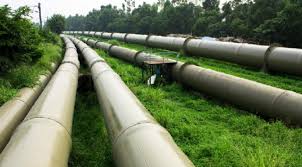Business
Nigeria’s Oil Reserve Grows By 1.4% To 37.5bll Natural Gas By 0.5%

The Nigerian Upstream Petroleum Regulatory Commission (NUPRC) has said Nigeria’s oil and gas reserves grew marginally in 2023 by 1.4 percent and 0.5 percent respectively.
NUPRC, in its annual national petroleum reserves position report, disclosed that as at January 1, 2024, revealed that oil reserves stood at 37.50 billion barrels compared to 36.966 recorded on January 1, 2023.
The reserve is made up of crude oil at 31.56 billion barrels and condensate oil at 5.94 billion barrels.
For natural gas, the Commission said reserves stood at 209 trillion cubic feet as at January 1, 2024, compared to 208.83TCF recorded over the corresponding period last year.
The gas reserve is made up of 102.59TCF of associated gas and 106.67TCF of non-associated gas.
At a press briefing in Abuja, the Chief Executive, NUPRC, Engr. Gbenga Komolafe, explained the growth of oil and gas reserves came from the contributions from the development of brown fields which were given out through the marginal field awards.
On the move to ensure that domestic refineries have enough crude oil for refining, Komolafe said a new template for domestic crude oil supply obligations has been released and has also become effective.
He stressed that with domestic crude oil supply obligations in place, he expects Nigeria to become self-sufficient in the supply of petroleum products when the Dangote and NNPC refineries come on stream fully in the second of the year.
“The strategic initiative aligns with the policy of the current administration and the declaration of President Bola Ahmed Tinubu that Nigeria is ready for business. Mr. President, as part of his fiscal policy, vacated barriers to investment in the oil and gas sector.
“Furthermore, this aligns with Nigeria’s commitment to bolstering domestic refining capacity and ensuring the sustainability of its oil industry.
“The template provides a transparent framework aimed at fostering collaboration among stakeholders for a thriving energy sector”, he said.
He disclosed that the template resolved about ten issues affecting crude supply to local refineries including load allocation and currency of payments.
Komolafe explained that the currency of payment will be mixed, adding “(a) the payment shall be in either United States Dollar or Naira or both, (b) where the payment is in both currencies, the payment split shall be as agreed in the SPA (Sales and Purchase Agreement) between the Producer and the Refiner”.
Business
Two Federal Agencies Enter Pack On Expansion, Sustainable Electricity In Niger Delta

Business
Why The AI Boom May Extend The Reign Of Natural Gas

Business
Ogun To Join Oil-Producing States ……..As NNPCL Kicks Off Commercial Oil Production At Eba


